- Serbia
Get to know Serbia
- Citizens
Culture and science
Health services
Pension and disability insurance
- Business
Employment
Economy
- Media
- Government
- Contact
Keep in touch
Contact form
Back
Keepin touch
Whether you have a question, comment, suggestion or any problem in the purview of the government, send us your message and we will try to respond as soon as possible. If your problem is not in our purview, we will forward your message to the relevant institution.
Q:
A:
Introduction of VAT yields positive results already in January
Belgrade/Krusevac,
15 February 2005
Serbian Minister of Finance Mladjan Dinkic said today in Krusevac that the introduction of the value-added tax (VAT) on January 1 this year has brought positive results already in the first month of its application, noting that the so-called grey economy has been reduced, while collection of taxes went up by 35 percent.
Dinkic told the businesspeople of Krusevac that the economic situation in the country is obviously getting better and that industrial and agricultural production grew 7 and 20 percent respectively, while the budget deficit went down.
According to him, the sale of Jubanka covered this year’s budget deficit. He also announced a budget revision in mid-2005, at which time tax rates will be reduced and some of the funds will be reallocated to culture and sport.
The finance minister said that the government is facing two big problems: a large foreign trade deficit and continual inflation growth. He said that market corrections will follow structural reforms of public companies such as ZTP, Jat Airways and Telekom, and through accelerated privatisation by the end of 2006 and possible bankruptcy for companies that do not go private.
Dinkic said that the third measure refers to a needed rationalisation of the public administration by at least 10 percent, confirming that the Serbian government and the National Bank of Serbia will continue the policy of a stable dinar. He said that inflation growth will be stopped in the middle of the year.
He reiterated that this year’s inflation rate will be around 9 percent, while also announcing expected growth in exports, production and jobs.
According to Dinkic, the Development Fund will have a more active and stable role, while the problems in crediting production and investment will be eliminated. Nine of the best banks have been chosen to credit the agriculture sector and a considerable drop in interest rates will be seen, he said.
The government will especially address the customs policy as customs controls will be stricter for all goods, particularly for those coming from non-EU markets.
The problems in controlling the turnover of goods with Kosovo-Metohija will be solved in the days to come through a new government decree, he said.
Dinkic said that the government is preparing a package of measures to cut unemployment. He said that micro loans will be approved for currently unemployed persons in the amounts from €5,000 to €20,000, with a 1 percent annual interest rate and one-year grace period.
The minister of finance also announced modernisation and reorganisation of the Tax Administration and stricter controls of implementation of tax laws. He also announced that the VAT law will be amended in June.
According to him, the sale of Jubanka covered this year’s budget deficit. He also announced a budget revision in mid-2005, at which time tax rates will be reduced and some of the funds will be reallocated to culture and sport.
The finance minister said that the government is facing two big problems: a large foreign trade deficit and continual inflation growth. He said that market corrections will follow structural reforms of public companies such as ZTP, Jat Airways and Telekom, and through accelerated privatisation by the end of 2006 and possible bankruptcy for companies that do not go private.
Dinkic said that the third measure refers to a needed rationalisation of the public administration by at least 10 percent, confirming that the Serbian government and the National Bank of Serbia will continue the policy of a stable dinar. He said that inflation growth will be stopped in the middle of the year.
He reiterated that this year’s inflation rate will be around 9 percent, while also announcing expected growth in exports, production and jobs.
According to Dinkic, the Development Fund will have a more active and stable role, while the problems in crediting production and investment will be eliminated. Nine of the best banks have been chosen to credit the agriculture sector and a considerable drop in interest rates will be seen, he said.
The government will especially address the customs policy as customs controls will be stricter for all goods, particularly for those coming from non-EU markets.
The problems in controlling the turnover of goods with Kosovo-Metohija will be solved in the days to come through a new government decree, he said.
Dinkic said that the government is preparing a package of measures to cut unemployment. He said that micro loans will be approved for currently unemployed persons in the amounts from €5,000 to €20,000, with a 1 percent annual interest rate and one-year grace period.
The minister of finance also announced modernisation and reorganisation of the Tax Administration and stricter controls of implementation of tax laws. He also announced that the VAT law will be amended in June.
-
 Belgrade, 28 November 2025
Belgrade, 28 November 2025Serbia, Italy dedicated to further strengthening partnership
-
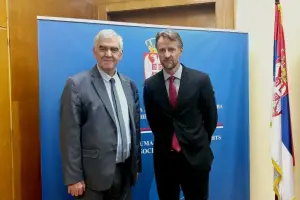 Belgrade, 28 November 2025
Belgrade, 28 November 2025Partnership with EU important for improvement of human, minority rights
-
 Belgrade, 28 November 2025
Belgrade, 28 November 2025Italy one of Serbia’s most important bilateral partners
-
 Belgrade, 28 November 2025
Belgrade, 28 November 2025Four bilateral documents exchanged between Serbia, DR Congo
-
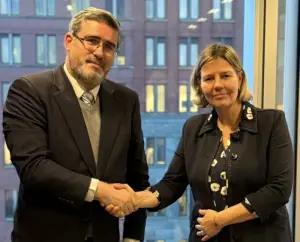 Belgrade/The Hague, 27 November 2025
Belgrade/The Hague, 27 November 2025Serbia committed to European integration process
-
 Belgrade, 27 November 2025
Belgrade, 27 November 2025Strengthening relations between Serbia, France through major infrastructure projects
-
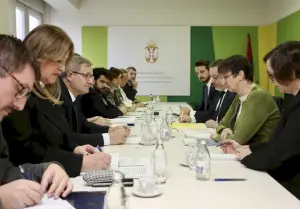 Belgrade, 27 November 2025
Belgrade, 27 November 2025Serbia, Germany dedicated to intensifying cooperation in field of agriculture
-
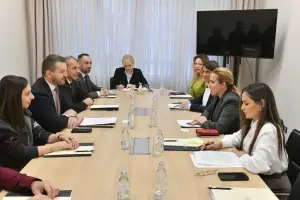 Belgrade, 27 November 2025
Belgrade, 27 November 2025Cooperation with Montenegro in modernising public administration
-
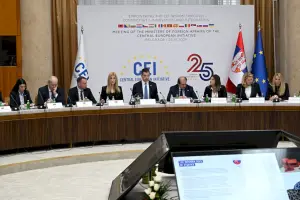 Belgrade, 26 November 2025
Belgrade, 26 November 2025CEI region remains committed to connectivity, integration, innovation
-
 Belgrade, 26 November 2025
Belgrade, 26 November 2025Joint work of Serbia, Ukraine in European integration process
